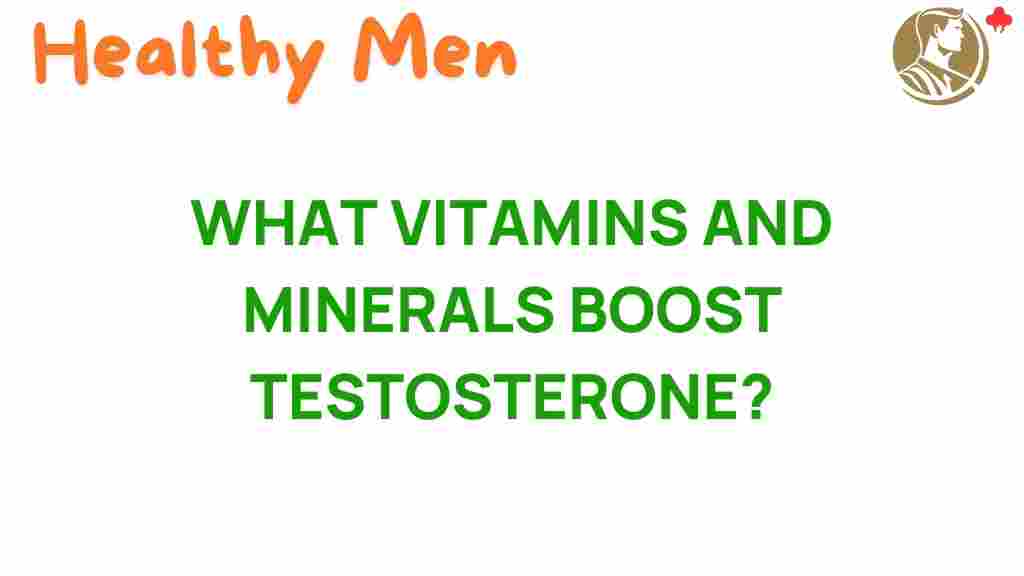Unlocking Vitality: Which Vitamins and Minerals Can Boost Testosterone?
In the quest for optimal health and vitality, maintaining balanced testosterone levels is crucial, especially for men. Testosterone plays a vital role in muscle mass, energy levels, mood, and overall well-being. However, factors such as age, stress, and lifestyle can lead to a decline in testosterone levels. In this article, we will explore essential vitamins and minerals that can boost testosterone, enhancing male health and wellness.
The Role of Testosterone in Male Health
Testosterone is a hormone produced primarily in the testes in men and is responsible for various bodily functions. It influences:
- Muscle and bone mass
- Fat distribution
- Red blood cell production
- Sexual function and libido
- Mood and energy levels
Maintaining healthy testosterone levels is essential for overall vitality and well-being. Below, we will discuss specific vitamins and minerals that can play a crucial role in boosting testosterone.
Key Vitamins That Boost Testosterone
Vitamin D
Vitamin D is often referred to as the “sunshine vitamin” because the body produces it in response to sunlight exposure. Research indicates that vitamin D can increase testosterone levels in men, especially those who are deficient in this essential nutrient.
Sources of Vitamin D include:
- Sunlight exposure
- Fatty fish (salmon, mackerel)
- Egg yolks
- Fortified foods (milk, orange juice)
- Supplements (Vitamin D3)
Vitamin B6
Vitamin B6 plays a significant role in hormone regulation and can help support testosterone levels. It is essential for the synthesis of neurotransmitters, which are vital for mood and energy levels.
Food sources rich in Vitamin B6 include:
- Poultry (chicken, turkey)
- Fish (tuna, salmon)
- Potatoes and starchy vegetables
- Non-citrus fruits (bananas, avocados)
Vitamin B12
Vitamin B12 is essential for red blood cell formation and neurological function. Deficiency in B12 can lead to fatigue and decreased testosterone levels. Including adequate B12 in your diet is crucial for maintaining energy and hormonal balance.
Sources of Vitamin B12 include:
- Meat (beef, liver)
- Dairy products (milk, cheese)
- Eggs
- Fortified cereals
Essential Minerals for Testosterone Production
Zinc
Zinc is a crucial mineral that plays a significant role in testosterone production. Studies have shown that zinc deficiency can lead to decreased testosterone levels. Supplementing with zinc can help restore testosterone levels in those who are deficient.
Good sources of zinc include:
- Oysters (one of the richest sources)
- Red meat
- Poultry
- Beans and lentils
- Nuts and seeds (pumpkin seeds, hemp seeds)
Magnesium
Magnesium is another essential mineral that can boost testosterone levels. It is vital for many biochemical reactions in the body, including hormone production. Adequate magnesium intake is associated with higher testosterone levels.
Foods high in magnesium include:
- Leafy greens (spinach, kale)
- Nuts (almonds, cashews)
- Seeds (chia seeds, flaxseeds)
- Whole grains (brown rice, quinoa)
Selenium
Selenium is a trace mineral that plays a role in reproduction and hormone metabolism. Some studies suggest that selenium supplementation may improve testosterone levels in men.
Sources of selenium include:
- Brazil nuts (one of the best sources)
- Seafood (tuna, shrimp)
- Meat (beef, chicken)
- Eggs
Nutrition and Lifestyle Tips for Boosting Testosterone
In addition to supplementation with vitamins and minerals, lifestyle factors play a significant role in maintaining healthy testosterone levels. Here are some tips to enhance your testosterone production:
- Regular Exercise: Engaging in both resistance training and cardiovascular exercise can help boost testosterone levels.
- Healthy Diet: Focus on a balanced diet rich in whole foods, lean proteins, healthy fats, and a variety of fruits and vegetables.
- Manage Stress: High stress levels can lead to elevated cortisol, which negatively impacts testosterone. Incorporate stress-reduction techniques such as meditation, yoga, or deep breathing exercises.
- Get Enough Sleep: Lack of sleep can significantly lower testosterone levels. Aim for 7-9 hours of quality sleep each night.
- Avoid Alcohol and Drugs: Excessive alcohol consumption and recreational drugs can negatively affect testosterone levels.
Supplementation: When and How to Consider It
While getting vitamins and minerals from food is ideal, some individuals may benefit from supplementation, especially if they have deficiencies. Before starting any new supplement regimen, consider the following:
- Consult a Healthcare Provider: It’s essential to discuss with a healthcare professional to determine if you need supplementation and the appropriate dosages.
- Choose Quality Supplements: Look for reputable brands that provide third-party testing to ensure the quality and potency of their products.
- Monitor Levels: If you are supplementing, regular blood tests can help you monitor your testosterone and nutrient levels to avoid excess intake.
Troubleshooting Tips for Low Testosterone Levels
If you suspect you have low testosterone levels, here are some troubleshooting steps to consider:
- Get Tested: A simple blood test can determine your testosterone levels. Consult with your doctor for testing options.
- Review Medications: Some medications can affect testosterone levels. Discuss with your healthcare provider if your medications might be influencing your hormone levels.
- Evaluate Your Lifestyle: Reflect on your diet, exercise routine, and stress management practices. Making necessary adjustments can significantly impact your testosterone levels.
- Consider Natural Remedies: Some natural supplements, such as fenugreek and ashwagandha, have also shown promise in supporting testosterone levels.
Conclusion
Maintaining optimal testosterone levels is essential for male health and overall vitality. Incorporating the right vitamins and minerals into your nutrition can significantly impact testosterone production. Essential nutrients like Vitamin D, Zinc, and Magnesium play crucial roles in boosting testosterone levels. Coupled with a healthy lifestyle that includes regular exercise, stress management, and quality sleep, you can unlock your vitality and enhance your overall wellness.
For more information about testosterone and male health, visit this resource.
Remember, before making any significant changes to your diet or supplementation, consult with a healthcare professional to ensure that you are making the best choices for your health.
This article is in the category Nutrition and created by healthymen Team
